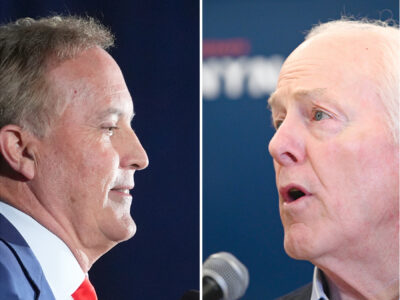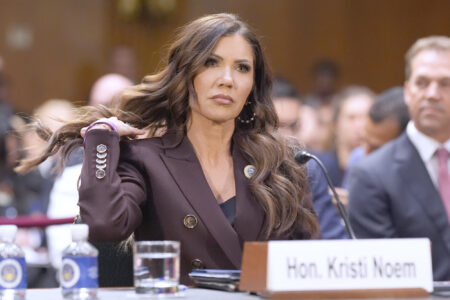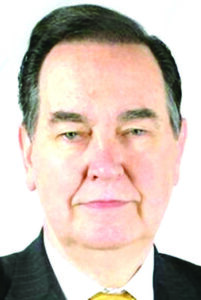Poll shows growing concerns about the US job market

President Donald Trump waves after arriving Friday on Air Force One at Palm Beach International Airport in West Palm Beach, Fla. (AP Photo/Mark Schiefelbein)
WASHINGTON (AP) — Americans are growing increasingly concerned about their ability to find a good job under President Donald Trump, an Associated Press-NORC Center for Public Affairs Research poll finds, in what is a potential warning sign for Republicans as a promised economic boom has given way to hiring freezes and elevated inflation.
High prices for groceries, housing and health care persist as a fear for many households, while rising electricity bills and the cost of gas at the pump are also sources of anxiety, according to the survey.
Some 47% of U.S. adults are “not very” or “not at all confident” they could find a good job if they wanted to, an increase from 37% when the question was last asked in October 2023.
Electricity bills are a “major” source of stress for 36% of U.S. adults at a time when the expected build-out of data centers for artificial intelligence could further tax the power grid. Just more than one-half said the cost of groceries are a “major” source of financial stress, about 4 in 10 said the cost of housing and health care were a serious strain and about one-third said they were feeling high stress about gasoline prices.
The survey suggests an ongoing vulnerability for Trump, who returned to the White House in January with claims he could quickly tame the inflation that surged after the pandemic during Democratic President Joe Biden’s term. Instead, Trump’s popularity on the economy has remained low amid a mix of tariffs, federal worker layoffs and partisan sniping that has culminated in a government shutdown.
The poll found that 36% of U.S. adults approve of how Trump is handling the economy, a figure that has held steady this year after he imposed tariffs that caused broad economic uncertainty. Among Republicans, 71% feel positive about his economic leadership. Yet that approval within Trump’s own party is relatively low in ways that could be problematic for Republicans in next month’s races for governor in New Jersey and Virginia, and perhaps even in the 2026 midterm elections.
At roughly the same point in Biden’s term, in October 2021, an AP-NORC poll found that 41% of U.S. adults approved of how he was handling the economy, including about 73% of Democrats. That overall number was a little higher than Trump’s, primarily because of independents — 29% approved of how Biden was handling the economy, compared with the 18% who currently support Trump’s approach.
The job market was meaningfully stronger in terms of hiring during Biden’s presidency as the United States was recovering from pandemic-related lockdowns. But hiring has slowed sharply under Trump with monthly job gains averaging less than 27,000 after the April tariff announcements.
People see that difference.
Four years ago, 36% of those in the survey were “extremely” or “very” confident in their ability to get a good job, but that has fallen to 21% now.
Biden’s approval on the economy steadily deteriorated through the middle of 2022 when inflation hit a four-decade high, creating an opening for Trump’s political comeback.
In some ways, Trump has made the inflation problems harder by choosing to cancel funding for renewable energy projects and imposing tariffs on the equipment needed for factories and power plants. Those added costs are coming before the anticipated construction of data centers for AI that could further push up prices without more construction.
Even though 36% see electricity as a major concern, there are some who have yet to feel a serious financial squeeze. In the survey, 40% identified electricity costs as a “minor” stress, while 23% said their utility bills are “not a source” of stress.
At a fundamental level, Trump finds himself in the same economic dilemma that bedeviled Biden. There are signs the economy remains relatively solid with a low unemployment rate, stock market gains and decent economic growth, yet the public continues to be skeptical about the economy’s health.
Some 68% of U.S. adults describe the U.S. economy these days as “poor,” while 32% say it’s “good.” That’s largely consistent with assessments of the economy over the past year.
In addition, 59%, say their family finances are “holding steady.” But only 12% say they’re “getting ahead,” and 28% say they are “falling behind.”
The sense of economic precarity is coming from many different directions, with indications that many think middle-class stability is falling out of reach.
The vast majority of U.S. adults feel at least “minor” stress about the cost of groceries, health care, housing, the amount they pay in taxes, what they are paid at work and the cost of gas for their cars.
In the survey, 47%, say they are “not very” or “not at all” confident they could pay an unexpected medical expense while 52% have low confidence they will have enough saved for their retirement. Also, 63%, are “not very” or “not at all” confident they could buy a new home if they wanted to.
Young adults are much less confident about their ability to buy a house, though confidence is not especially high across the board. About 8 in 10 U.S. adults under age 30 say they are “not very confident” or “not at all confident” they would be able to buy a house, compared with about 6 in 10 adults 60 and older.
For 54% of U.S. adults, the cost of groceries is a “major source” of stress in their life right now.
The AP-NORC poll of 1,289 adults was conducted Oct. 9-13, using a sample drawn from NORC’s probability-based AmeriSpeak Panel, which is designed to be representative of the U.S. population. The margin of sampling error for adults overall is plus or minus 3.8 percentage points.




